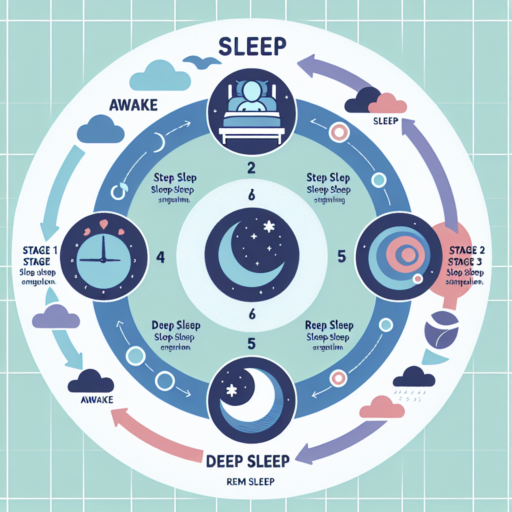Understanding Deep Sleep: Why It Matters
Deep sleep, or slow-wave sleep, is a critical phase of our sleep cycle that is often overlooked. It plays a significant role in our overall health and well-being. This stage of sleep is responsible for physical recovery, memory consolidation, and ensuring our energy levels are replenished for the next day. Understanding the importance of deep sleep can help individuals prioritize their sleep routines and enhance their quality of life.
Physical and Mental Health Benefits
During deep sleep, the body goes into a state of recovery, repairing muscles, tissues, and cells. This process is crucial for physical health, aiding in the reduction of inflammation and bolstering the immune system. Moreover, deep sleep contributes to mental health by supporting emotional regulation, cognitive function, and memory consolidation. The brain processes and stores new information obtained during the day, making this phase vital for learning and memory retention.
The quality of deep sleep directly affects our energy levels and mood the following day. A lack of deep sleep can lead to feelings of lethargy and irritability, impacting our overall productivity and well-being. By prioritizing deep sleep, individuals can enhance their day-to-day performance and foster a more positive outlook on life.
In summary, deep sleep is an indispensable component of our sleep cycle that supports a myriad of bodily functions, from physical recovery to cognitive performance. Understanding and valuing this stage of sleep can lead to improved health, mental clarity, and quality of life.
How Much Deep Sleep Do You Need Per Night?
Understanding the quantity of deep sleep required per night is crucial for optimizing health and well-being. Deep sleep, also known as the restorative stage of sleep, plays a key role in healing and repairing your body. Adults typically need to secure a certain amount of deep sleep to function at their best during waking hours.
The American Academy of Sleep Medicine and the Sleep Health Foundation suggest that adults aim for 7 to 9 hours of sleep per night, with a portion of that being deep sleep. The exact percentage of deep sleep, however, can vary from person to person. On average, a healthy adult may spend about 13-23% of their total sleep in the deep sleep stage. This equates to roughly 60 to 110 minutes for someone sleeping 8 hours a night.
To ensure you are getting enough deep sleep, paying attention to your overall sleep hygiene is essential. This involves maintaining a regular sleep schedule, ensuring your sleeping environment is conducive to rest, and avoiding stimulants before bedtime. While the emphasis is often on the total hours of sleep, the quality of your sleep and how much of it is deep sleep can significantly impact your health and energy levels throughout the day.
The Benefits of Deep Sleep: Improving Your Health
Deep sleep, also known as slow-wave sleep, plays a critical role in our overall health and well-being. This stage of sleep is when the body and mind undergo significant recovery and rejuvenation. During deep sleep, our bodies are hard at work repairing tissue, strengthening the immune system, and consolidating memories, among other vital processes. Understanding the myriad benefits of deep sleep can provide insights into how critical it is to prioritize sleep quality in our lives.
Enhanced Brain Function and Memory
One of the most notable benefits of deep sleep is its impact on brain function and memory consolidation. During the deepest stages of sleep, the brain begins to organize and process the information gathered throughout the day, transforming short-term memories into long-term ones. This process is crucial for learning and memory retention, highlighting the importance of achieving sufficient deep sleep for cognitive health and development.
Improved Physical Health
Deep sleep also plays a significant role in physical health. It’s during this restorative phase that the body repairs muscles and tissues, supports growth and development, and boosts the immune system. These processes are essential for maintaining overall physical health and can help in reducing the risk of chronic diseases. Furthermore, deep sleep has been linked to improved heart health, as it helps to lower blood pressure and regulate heart rate, offering a protective effect against heart disease.
In addition to the benefits mentioned above, deep sleep is critical for emotional and mental well-being. It helps to regulate mood, reduce stress, and decrease the likelihood of developing mental health disorders such as depression and anxiety. Achieving regular, quality deep sleep can lead to better emotional resilience and an improved ability to cope with daily stressors. This aspect of deep sleep underscores its role not just in physical health, but in maintaining a balanced and healthy psychological state as well.
What Happens If You Don’t Get Enough Deep Sleep?
Not getting enough deep sleep can lead to a host of issues that affect both your mind and body. Deep sleep, also known as slow-wave sleep, is critical for the body’s rejuvenation and repair. Deprivation of this sleep phase can have immediate and long-term effects on health.
One of the most immediate impacts of lacking deep sleep is on your cognitive functions. You may find it harder to concentrate, remember things, or make decisions. This is because deep sleep plays a significant role in memory consolidation and brain detoxification. Without sufficient deep sleep, the brain can’t efficiently remove toxins that accumulate during the day, potentially increasing the risk for neurodegenerative diseases.
Physically, the absence of adequate deep sleep can weaken the immune system’s effectiveness, making you more susceptible to infections and illnesses. It can also disrupt the balance of hormones in the body, including those responsible for appetite regulation. This hormonal imbalance can lead to increased hunger and cravings, often resulting in weight gain over time. Additionally, prolonged lack of deep sleep has been linked to serious health conditions, such as heart disease, high blood pressure, and diabetes.
Impact on Emotional and Mental Health
The consequences of not getting enough deep sleep extend to emotional and mental health as well. People who consistently miss out on deep sleep are more likely to experience mood swings, anxiety, and depression. This reduction in sleep quality can diminish the brain’s ability to regulate emotions effectively, leading to heightened stress and irritability.
Strategies to Increase Deep Sleep Each Night
Enhancing the quality of deep sleep is crucial for overall well-being, and several strategies can be employed to achieve this goal. Engaging in these practices consistently can lead to significant improvements in sleep quality, ensuring that you wake up feeling rested and rejuvenated. Deep sleep, or slow-wave sleep, plays a vital role in physical and mental health, making it essential to optimize our sleep patterns.
Establish a Consistent Sleep Schedule
Maintaining a consistent sleep schedule is foundational to increasing deep sleep. Going to bed and waking up at the same time every day, including weekends, helps regulate your body’s internal clock. This regularity encourages a more structured sleep pattern, allowing for more predictable and quality deep sleep cycles. Utilizing techniques like relaxation exercises or a winding-down routine before bed can further enhance this effect.
Optimize Your Sleep Environment
Your sleeping environment plays a significant role in determining how well you sleep through the night. Ensuring your bedroom is conducive to sleep involves minimizing noise and light, maintaining a comfortable, cool temperature, and investing in a good-quality mattress and pillows. Bold aromatherapy with scents such as lavender can also help soothe your mind and prepare your body for rest, facilitating deeper sleep stages.
Finally, tweaking your pre-sleep activities can have a substantial impact on your ability to enter deep sleep stages. Avoiding stimulants such as caffeine and electronics at least an hour before bedtime can prevent disturbances in your sleep cycle. Additionally, incorporating calming activities, such as reading or taking a warm bath, can signal to your body that it’s time to wind down, further promoting deeper sleep periods.
Tracking Your Sleep: How to Determine Your Deep Sleep Levels
Understanding and monitoring your sleep patterns can significantly impact your overall health and well-being. Deep sleep, or slow-wave sleep, plays a crucial role in your body’s recovery process, helping to restore energy, repair tissues, and strengthen the immune system. However, determining your deep sleep levels might seem challenging without the right tools and knowledge. In today’s digital age, several methods and devices can assist you in tracking your sleep with precision.
One effective way to monitor your deep sleep stages is through wearable technology. Devices like smartwatches and fitness trackers can provide insights into your sleep cycle by measuring your heart rate and movements throughout the night. They typically categorize your sleep into light, REM, and deep phases, offering a detailed overview of your sleep quality. To get the most accurate readings, it’s essential to wear your device correctly and consistently each night. Reviewing your sleep data regularly can help you identify patterns and make necessary adjustments to enhance your sleep quality.
Another approach involves using mobile apps designed to track sleep. These applications use your smartphone’s accelerometer and microphone to analyze your sleep patterns. By placing your phone on your mattress, the app can record movements and sounds, estimating how much time you spend in each sleep stage. While not as precise as wearable devices, these apps can still offer valuable insights into your nightly rest. It’s important to select an app that respects your privacy and securely handles your data.
Deep Sleep and Age: How Your Needs Change Over Time
Understanding the relationship between deep sleep and age is essential for maintaining optimal health and well-being throughout the lifespan. As we journey from childhood into our senior years, our bodies undergo significant changes, and so do our sleep needs. Deep sleep, also known as slow-wave sleep, plays a crucial role in memory consolidation, physical rejuvenation, and overall health. However, the amount of deep sleep we require and are able to attain naturally shifts as we age.
The Evolution of Sleep Patterns from Childhood to Adulthood
Children and adolescents typically experience a higher amount of deep sleep in comparison to adults. This is primarily because their bodies and brains are still developing, necessitating more profound restorative processes during sleep. As individuals transition into adulthood, the percentage of deep sleep begins to decrease. This reduction continues progressively, making it increasingly challenging for older adults to achieve sustained periods of deep sleep. Consequently, this change can impact several aspects of health and cognitive function.
Challenges in Achieving Deep Sleep with Advancing Age
Several factors contribute to the difficulty older adults face in achieving deep sleep. Changes in the body’s internal clock, or circadian rhythm, can significantly alter sleep patterns, often leading to earlier bedtimes and wake times but less overall deep sleep. Additionally, health issues common among seniors, such as sleep apnea, arthritis, and the frequent need to urinate during the night, can interrupt the sleep cycle, further reducing the opportunity for deep sleep. Lifestyle factors, such as medication use and less physical activity, can also play a role in diminishing the quality of sleep as one ages.
Common Obstacles to Deep Sleep and How to Overcome Them
Experiencing a good night’s sleep is crucial for both physical and mental health. However, various factors can hinder our ability to dive into deep, restorative sleep. Recognizing these obstacles is the first step in creating a bedtime routine that promotes true rest. Below, we delve into common impediments to deep sleep and offer practical advice on overcoming them.
Excessive Screen Time Before Bed
In today’s digital age, our exposure to screens is almost constant. Research suggests that the blue light emitted by phones, tablets, and computers can significantly disrupt our natural sleep cycle. The blue light interferes with the production of melatonin, a hormone that signals our brain it’s time to sleep. To combat this, adopting a digital curfew at least an hour before bedtime can be beneficial. Consider replacing screen time with calming activities like reading a book or taking a warm bath to encourage your body to wind down.
Caffeine and Alcohol Consumption
While a late-afternoon coffee or a nightcap may seem harmless, both caffeine and alcohol have been found to negatively affect sleep quality. Caffeine can stay in your bloodstream for up to 8 hours, keeping you in a state of alertness that’s counterproductive to sleep. On the other hand, while alcohol may initially make you feel sleepy, it disrupts your sleep cycle later in the night. Limiting caffeine intake to the mornings and reducing alcohol consumption, especially close to bedtime, can significantly improve your sleep quality.
Stress and Anxiety
Stress and anxiety are perhaps the most pervasive factors that impede deep, restful sleep. The stress-induced hormone cortisol can keep your mind racing, making it difficult to fall asleep or stay asleep. Incorporating relaxation techniques such as meditation, deep breathing exercises, or gentle yoga before bed can help manage stress levels and prepare your body and mind for sleep. Additionally, maintaining a regular sleep schedule and creating a comfortable sleep environment can reinforce your body’s sleep-wake cycle, further promoting deep sleep.
No se han encontrado productos.
Natural Remedies and Practices to Promote Deep Sleep
Deep sleep is crucial for maintaining optimal health and well-being, but its attainment often eludes many. Natural remedies and practices have emerged as a beacon of hope for those struggling to find restful nights. From herbal interventions to mindfulness techniques, these methods embody a holistic approach to enhancing sleep quality without the need for pharmaceutical aids.
Herbal Remedies to Enhance Sleep Quality
Among the plethora of natural solutions, certain herbs stand out for their sleep-promoting properties. Chamomile and Lavender are two such examples, widely revered for their calming and soothing effects on the mind and body. Chamomile, often consumed as tea, contains apigenin, an antioxidant that binds to specific receptors in the brain to reduce insomnia and facilitate deeper sleep. Similarly, Lavender’s gentle aroma has been shown to lower heart rate and blood pressure, paving the path towards a more tranquil rest.
Mindfulness and Relaxation Techniques
The power of the mind cannot be underestimated when striving for deep sleep. Mindfulness practices, such as meditation and deep breathing exercises, serve as powerful tools for reducing stress and anxiety, which are common culprits behind disrupted sleep patterns. Incorporating these practices into your nighttime routine can significantly improve your ability to fall asleep faster and enter the restorative stages of deep sleep more readily. Focusing on the breath, in particular, helps in diverting the mind from daily stresses, anchoring it in the present moment, and inducing a state of deep relaxation.
In today’s fast-paced world, achieving deep sleep can sometimes feel like an elusive goal. However, by incorporating these natural remedies and practices into our daily routines, we open up new avenues for attaining the restful and rejuvenating sleep our bodies and minds so desperately need. Exploring herbal remedies and mindfulness techniques not only offers a pathway to better sleep but also enhances overall health and wellness.
Advanced Techniques and Technologies for Enhancing Deep Sleep
The quest for a better night’s sleep has led to the emergence of cutting-edge techniques and technologies designed to enhance deep sleep. Deep sleep, a critical phase of our sleep cycle, is essential for physical recovery, memory consolidation, and overall well-being. Understanding and leveraging these advanced methods can significantly improve sleep quality and, by extension, one’s quality of life.
Optimizing Sleep Environment with Smart Home Technology
The integration of smart home technology has revolutionized the way we create our ideal sleeping environment. Tools such as programmable thermostats allow for the automatic adjustment of bedroom temperature, a key factor in promoting deep sleep. Similarly, smart lighting systems can dim or change color to mimic the natural progression of the sun, aligning with our body’s circadian rhythm. Noise-canceling devices and smart sound machines that produce white noise or nature sounds are also instrumental in blocking out disruptive noises, creating a serene atmosphere conducive to deep sleep.
Wearable Sleep Trackers and Apps
The advent of wearable technology has provided unprecedented insights into our sleep patterns. Devices worn on the wrist or placed under the mattress monitor heart rate, movements, and even breathing patterns throughout the night. Coupled with sophisticated algorithms, these gadgets offer personalized recommendations for improving sleep quality, such as adjusting bedtime routines or pinpointing disturbances that prevent deep sleep phases. Mobile apps linked to these devices also serve to guide relaxation techniques before bed, including meditation, controlled breathing, and guided imagery, further enhancing the potential for deep restorative sleep.
Dietary Adjustments and Supplements
Emerging research highlights the significant role of diet and supplements in promoting deep sleep. Certain nutrients and compounds, such as magnesium, L-theanine, and melatonin, have been found to enhance the quality of sleep. Incorporating foods rich in these components or taking targeted supplements can help in extending the duration of deep sleep phases. It is essential, however, to consult with a healthcare professional before beginning any new dietary regimen focused on improving sleep.



